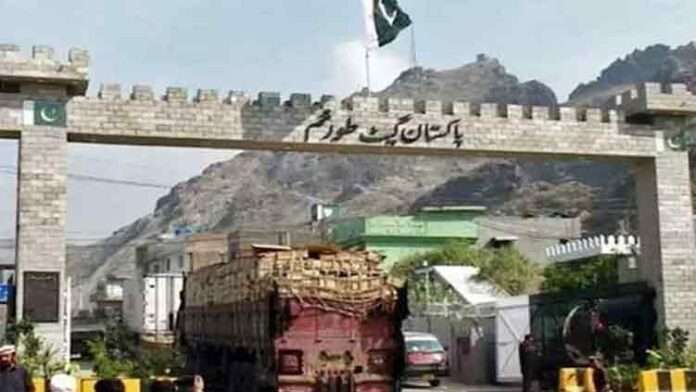After being closed for nine days, the Pakistan-Afghanistan border at Torkham reopened to all types of traffic on Friday.
The border, which is heavily used for trade activities by people on both sides, was shut down following clashes between border forces.
Following the resumption of traffic at the border, pedestrian movement started, and hundreds of people flocked to the immigration area to enter Afghanistan.
Irshad Khan Mohmand, the assistant commissioner of Pakistan’s Khyber district, told AFP that “the clearance of trucks is in process” and that “Afghan citizens are entering Afghanistan after clearance and passing immigration processes.”
The issue was resolved through a series of talks between Pakistani and Afghan officials, and the border was opened, according to a security official in Torkham who spoke on the condition of anonymity due to the nature of the situation.
According to him, thousands of loaded vehicles were stranded at the border crossing in northwest Pakistan, on both sides of the border.
Pakistan claimed that the Taliban government had attempted to invade its territory by erecting an “illegal structure” and charged Afghan forces with “indiscriminate firing.”
The Taliban’s foreign ministry claimed that Pakistani security forces had opened fire on its soldiers, who were repairing a dilapidated security post close to the border. They criticised the border’s closure at a crucial point of entry for Afghanistan, which is a landlocked country.
Continue scrolling to see an advertisement.
In particular, border disputes and Pakistan’s allegations that militants can launch attacks into its territory from bases in Afghanistan have strained relations between the two neighbours at times. The Afghan government disputes this.
The agreement was reached after Ubaid Ur Rehman Nizamani, the head of Pakistan’s mission in Kabul, met with acting Afghan foreign minister Amir Khan Muttaqi.
The Afghan government promised Pakistan during the meeting that Afghan soil wouldn’t be used against them.
Termination on September 6
After clashes between security forces from the two nations on September 6, Pakistan’s main border crossing with Afghanistan was shut down, causing a buildup of trucks hauling cargo.
According to local authorities, the busy border crossing was shut down after Pakistani and Afghan Taliban forces began exchanging fire.
In the eastern Nangarhar province of Afghanistan, where the crossing is located, a spokesman for the Taliban-led police told Abdul Basir Zabuli that investigators from both nations were attempting to ascertain what sparked the altercation.
The main crossing point for people and cargo between Pakistan and landlocked Afghanistan is at the Torkham border post.
The Pakistan-Afghanistan Joint Chamber of Commerce and Industry’s director, Ziaul Haq Sarhadi, claimed that the closure had caused hundreds of trucks carrying fruit, vegetables, and other goods to become stuck.
“The traders are suffering heavy losses after the border in Torkham was closed on Wednesday following a firing incident there,” he told Reuters.
The loading of goods in Karachi, Pakistan’s southern port, had been disrupted, and the entire flow of commerce had been impacted.
The 2,600-kilometre (1,615-mile) border has been the source of disputes between the neighbours for many years.
Separately, the Pakistani military reported that 12 militants were killed along with four soldiers during clashes on Wednesday in the Chitral district, close to the Afghan border.
In a statement, the Pakistani Taliban, also known as Tehreek-e-Taliban Pakistan (TTP), claimed that for the previous two days, its fighters had engaged in combat with local law enforcement.
After the clashes in Chitral, a mountainous region close to the Afghan border that is popular with Pakistani and foreign tourists, the Pakistani military reiterated its demands to the Afghan Taliban authorities to stop using its territory for militant attacks.
The Afghan Taliban have denied that militants are using their territory, claiming that Pakistani authorities should be concerned about security in their neighbour.
In recent years, the number of attacks in Pakistan with TTP claims has increased. Although not a direct member of the Afghan Taliban, the group has sworn allegiance to them.






